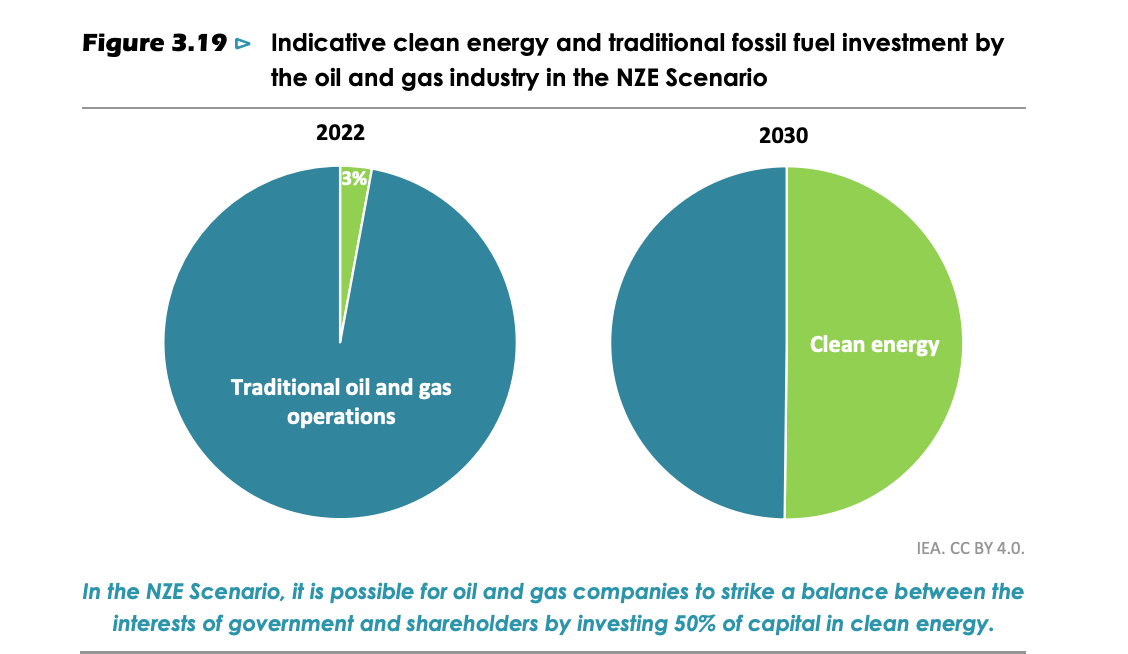Fossil fuel companies aren’t advancing climate solutions. This report proves it.
Oil companies are promoting “illusory” solutions instead of funding real ones, a new report by the International Energy Agency found.
Emily Sanders is the Center for Climate Integrity’s editorial lead.
Oil companies talk a big game about their commitment to addressing climate change — but most of them aren’t actually participating in the clean energy transition at all, the latest report by the International Energy Agency (IEA) has found.
Instead of investing in clean energy, the IEA said last week, fossil fuel companies are marketing “illusory” solutions like carbon capture and storage while opening new oil and gas developments that will continue to fuel climate chaos.
The IEA, an intergovernmental organization established after the 1973 oil crisis to help shape global energy policies, said oil companies face a “moment of truth” about their role in the energy transition “amid a worsening climate crisis fuelled in large part by their core products.”
Climate advocates said the report represented a noticeable shift in tone for the IEA. Dr. Genevieve Guenther, founding director of End Climate Silence and affiliate faculty at The New School, said it symbolized the end of the agency’s historic reluctance to “point the finger directly” at fossil fuel companies for the climate crisis. In recent years, she said, “they have gone from talking about this as a market-based problem to suggesting that we haven’t made more progress on slashing emissions because fossil energy producers have been actively obstructing change.”
The report was published just before the start of COP28 in Dubai, where the agency forecasts “the industry’s engagement with clean energy transitions will be a key topic.” The U.N. climate talks have in fact already been compromised by fossil fuel interests, yet again, after CEO of Abu Dhabi National Oil Company Sultan Al Jaber reportedly planned to use his position as host to lobby for oil and gas deals around the world. Al Jaber, who represents himself as a supporter of renewable energy and climate action, was recognized as a “climate leader” by TIME earlier this month.
“I think there's been a continued trust in the word of the industry and continued willingness to give them the chance to change,” said Guenther. “It’s almost as if the IEA threw down the gauntlet before COP28 and said ‘prove [it]’.”
Here are the major takeaways from the IEA’s report:
Oil companies’ clean energy investments are nearly nonexistent.
Ahead of COP28, oil companies ramped up advertising campaigns to promote their supposed commitments to renewables and “low carbon solutions.” According to a report published this week by Climate Action Against Disinformation (CAAD), 13 fossil fuel companies collectively spent up to $5.21 million on Facebook ads between January and October 31st. Much of that advertising “oversell[s] the contribution of industry actors to achieving ‘net zero’, in line with agendas like the Paris Climate Agreement — for example through supposed investment in ‘green solutions’ like wind and solar energy, as well as technology like Carbon Capture and Storage (CCS) for continued fossil fuel extraction,” CAAD concluded. Ninety-eight percent of that spending came from Shell, Exxon, BP and TotalEnergies.
But oil and gas companies remain a “marginal force” in the clean energy transition, according to the IEA, making up less than 1% of clean energy investment globally.
To meet the goals of the Paris Agreement, fossil fuel companies would need to invest close to 50% of their capital expenditures in clean energy by the end of the century, the agency said. In 2022, the industry’s total investment was closer to 2.5%.
“Very often the people who are pointing out these discrepancies between the words of oil and gas companies and their deeds are activists, so it was heartening to see that a specifically apolitical body is making that same point,” Guenther said.
Four companies accounted for 60% of all oil companies’ clean energy investments, the IEA found: Equinor, TotalEnergies, Shell and BP. The two U.S. supermajors, Exxon and Chevron, were notably absent in that count.
Still, even the companies that contributed more to renewables have continued to double down on fossil fuels while blaming consumers for their lack of significant emissions reductions. An FAQ on Shell’s corporate website, explaining the company’s appeal of a Dutch court ruling that would force it to reduce its emissions, claims that “Shell alone cannot directly influence the energy choices made by its customers.”
While not naming any companies in particular, the IEA calls the industry’s blame-shifting language out directly: “‘When the energy world changes, so will we’ is not an adequate response to the immense challenges at hand,” the report reads.
New fossil fuel projects are a no-go.
If the world is to keep warming within the critical threshold of 1.5 degrees, oil and gas use would need to fall by 75% by 2050, the IEA found. Maintaining the 1.5 degree mark also means no new fossil fuel exploration or developments — a warning the agency has been giving for years, which the industry has so far flouted.
“The uncomfortable truth that the industry needs to come to terms with is that successful clean energy transitions require much lower demand for oil and gas, which means scaling back oil and gas operations over time – not expanding them,” IEA executive director Fatih Brihol wrote in the foreword to the report.
Some companies, like Exxon and Chevron, have recently been more straightforward about their lack of intention to shift away from fossil fuels (in Exxon CEO Darren Woods’ words, “we’re not an electron company. We’re a molecule company.”)
But even for those companies that “may take the view that their specialisation is in oil and natural gas,” the report says, “aligning their strategies with net zero transitions would then require them to scale back oil and gas activities while investing in scope 1 and 2 emissions reductions.” Last month, Exxon and Chevron each secured massive oil deals that will drastically expand their oil and gas production.
“The problem is not clean energy growing too slow, the problem is the fossil industry expanding fossil fuels,” Glen Peters, Senior Researcher at the Center for International Climate Research, posted to X in response to the report,
Carbon capture won’t fix the climate.
Instead of investing in clean energy, oil and gas giants are investing billions in carbon capture in a race to sell policymakers and the public on the technology as a climate fix that will allow for the continued production of fossil fuels. But those plans are unrealistic at best, the IEA reports, stating that if oil and gas consumption were to continue at projected rates under today’s policy standards, keeping temperature rise within the 1.5 degree threshold would require “an entirely inconceivable” level of captured carbon emissions.
Indeed, an analysis released this week by InfluenceMap found that more than 80% of CCS advocacy by oil and gas companies since 2021 does not align with the 1.5 degree mark.
Powering the industry’s carbon capture facilities would also require a greater amount of electricity than today’s electricity demand across the globe — and $3.5 trillion in annual investment by 2050, the IEA’s report found.
The fossil fuel industry needs to “le[t] go of the illusion that implausibly large amounts of carbon capture are the solution,” said Birol.
Instead, the IEA says, the companies could focus on reducing methane pollution as the “single most important and cost-effective way for the oil and gas industry to bring down its emissions” by the end of the decade. That seems unlikely, as the industry criticizes EPA methane rules to be announced at COP tomorrow.
Keep your eyes peeled…
The Organization of the Petroleum-Exporting Countries (OPEC), which coordinates oil producing countries “in order to collectively influence the global oil market and maximize profit,” responded to the IEA’s report saying it “unjustly vilifies the industry as being behind the climate crisis.”
“We must understand that when you put the arsonist in charge of putting out the fire, that fire is going to rage until it burns the entire house down,” said Rachel Rose Jackson, Director of Research and International Policy on Climate for Corporate Accountability.
“Big polluters are consistently allowed VIP access to the very halls and buildings where local and global climate action is being shaped — despite the hundreds of millions of dollars they spend to undermine that very action, and the decades they wasted deceiving the public about climate change,” she said. “When the IEA starts calling [them] out for their lack of meaningful climate action, you know it’s time for a reckoning.”
ICYMI: If you’re at COP28 this week and want to fact-check Big Oil’s talking points and track their lobbying, a new resource database from InfluenceMap could help.





☠️☠️💀OF COURSE THEY'RE NOT!!
Damn crooks they are destroying our Planet!!!